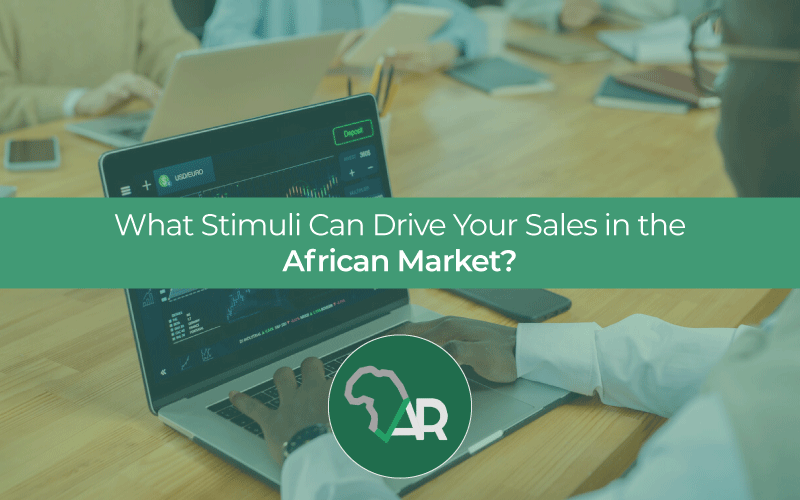What Stimuli Can Drive Your Sales in the African Market?
Africa has caught the attention of major corporations from different industries all over the globe as the next big emerging market. For the past two decades, Africa’s potential was somewhat shadowed by Asian markets, but they still reported above-average GDP growth, according to a report by Deloitte.
With over 1.2 billion people on this geographically rich continent, there’s a massive opportunity for big and small businesses alike. That said, it doesn’t come without its challenges.
Penetrating a new market is a struggle, but a market like Africa can be a bit more complicated. With its fragile socioeconomic fabric, strong cultural influence, and limited buying power, any new product or service must shine to gain momentum.

Here are some ways you can increase sales and drive growth as you expand into the African market:
Target All Urban Centers
Africa has nearly as many cities with a population of over one million as North America. However, many companies fail to identify this rapid urbanisation of the content.
Rather than just going for big population centres, companies should also promote their products and services in smaller cities. Although the income there isn’t as high as that in the big cities, these cities and towns can help drive sales immensely for fast-moving consumer goods.
What this means is that your marketing campaign should also focus on these smaller cities. So whether you’re using billboards, TV advertisements, or social media posts, make sure that these emerging urban centres are also targeted.
Utilise Mobile Communication
The growth and success of the telecommunication industry in Africa have been phenomenal. In countries like Nigeria, the year-on-year increase in the number of mobile phone users has been almost 100%. Now, with smartphones, things are even better.
You don’t have to be in the telecom business to benefit from this boom. This is a collective opportunity for all types of companies to use this rapid growth to their advantage.
More people having access to the internet means more opportunities to market and sell online.
Yes, the African market is far from becoming as accustomed to online buying as other emerging markets like India, but there’s still untapped potential. Right now, it’s a first-come-first-serve kind of situation. The companies that go into the market first have the opportunity to dominate in the upcoming years.
Use Mobile Payment Solutions
Consider this an extension of the last point. Many African countries have their own online payment systems. The shining example of that would be Zimbabwe, which managed to pull itself out of the financial crisis it faced using a mobile payment system.
Although still not as sophisticated as international online payment platforms, African mobile payment solutions provide businesses with an opportunity to make it convenient for their customers to buy their products.
In October 2020, Stripe acquired the Nigerian mobile payment company Paystack. This acquisition in and of itself is a massive indicator of more significant players in the African market.
So going forth, no matter what your business area is, incorporating mobile payments will be crucial for success in this emerging market.
Use African Translation Service
Experts say that children learn faster when they are taught in their mother tongue. This could be applied to marketing and advertisements as well. Furthermore, it’s essential to connect with and reach the people’s hearts to speak with them in their language.
You can make clever campaigns, spend millions on production and publication, but it won’t matter if people don’t truly understand it. Also, Africans take pride in their language.
Use African translation service to make your ad campaigns catchy in the local language. Yes, many formerly colonised countries still use European languages. However, you can do well if you go with their ethnic languages.
Conversely, you can translate African languages into second languages for bigger cities where they are primarily spoken, for instance, English in Lagos or French in Abidjan.
Keep Prices Competitive
It’s essential to be realistic about things on the ground. While the numbers we read in magazines like Forbes and The Economist show a promising picture of African economies, the reality is that Africa is still dealing with a high rate of poverty.
While the poverty rate varies by region, generally speaking, the continent lacks the buying power of places like the US, European Union, or China. What this means is that pricing is significant for the African consumer.
Keeping prices low or competitive is a good formula for any place, but it will work best in the African markets. Offering wholesale rates, discounts, or other incentives can help entice new customers.
That’s not to say that you should cheap out on quality. African consumers are very sophisticated and have an eye for quality.
Respect Culture and Emotions
Africa is a mix of many cultures, languages, and identities, making it increasingly difficult for companies to navigate the market, mainly if they cover different regions.
What may work in South Africa might not do so well in the Horn of Africa. So even if you’re a big corporation expanding all over Africa, taking a localised approach will prove more successful.
Ensure to respect the place’s culture with the product/service you offer, how you market it, and how you present it. Africans take pride in their culture, which you could use to your advantage as well. Rather than taking a globalised approach, take the time to study the specific market’s customs, norms, and emotions and incorporate that in every step of marketing and sales.
Africa, especially Sub-saharan Africa, presents a brilliant opportunity for countries and corporations. Still, there are pitfalls that one must avoid.
With a fast-growing population with increasing incomes, the African market would require carefully thought out and well-executed campaigns to drive sales. At the end of the day, it’s simple: keep a local approach, don’t mess with the norms, and use an African translation service to translate African languages.
